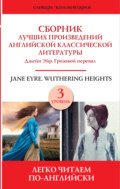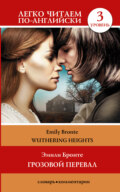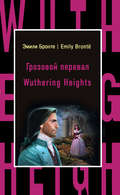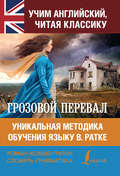полная версия

Эмили Бронте
Poems by Currer, Ellis, and Acton Bell
THE WOOD
But two miles more, and then we rest!
Well, there is still an hour of day,
And long the brightness of the West
Will light us on our devious way;
Sit then, awhile, here in this wood —
So total is the solitude,
We safely may delay.
These massive roots afford a seat,
Which seems for weary travellers made.
There rest. The air is soft and sweet
In this sequestered forest glade,
And there are scents of flowers around,
The evening dew draws from the ground;
How soothingly they spread!
Yes; I was tired, but not at heart;
No – that beats full of sweet content,
For now I have my natural part
Of action with adventure blent;
Cast forth on the wide world with thee,
And all my once waste energy
To weighty purpose bent.
Yet – sayst thou, spies around us roam,
Our aims are termed conspiracy?
Haply, no more our English home
An anchorage for us may be?
That there is risk our mutual blood
May redden in some lonely wood
The knife of treachery?
Sayst thou, that where we lodge each night,
In each lone farm, or lonelier hall
Of Norman Peer – ere morning light
Suspicion must as duly fall,
As day returns – such vigilance
Presides and watches over France,
Such rigour governs all?
I fear not, William; dost thou fear?
So that the knife does not divide,
It may be ever hovering near:
I could not tremble at thy side,
And strenuous love – like mine for thee —
Is buckler strong 'gainst treachery,
And turns its stab aside.
I am resolved that thou shalt learn
To trust my strength as I trust thine;
I am resolved our souls shall burn
With equal, steady, mingling shine;
Part of the field is conquered now,
Our lives in the same channel flow,
Along the self-same line;
And while no groaning storm is heard,
Thou seem'st content it should be so,
But soon as comes a warning word
Of danger – straight thine anxious brow
Bends over me a mournful shade,
As doubting if my powers are made
To ford the floods of woe.
Know, then it is my spirit swells,
And drinks, with eager joy, the air
Of freedom – where at last it dwells,
Chartered, a common task to share
With thee, and then it stirs alert,
And pants to learn what menaced hurt
Demands for thee its care.
Remember, I have crossed the deep,
And stood with thee on deck, to gaze
On waves that rose in threatening heap,
While stagnant lay a heavy haze,
Dimly confusing sea with sky,
And baffling, even, the pilot's eye,
Intent to thread the maze —
Of rocks, on Bretagne's dangerous coast,
And find a way to steer our band
To the one point obscure, which lost,
Flung us, as victims, on the strand; —
All, elsewhere, gleamed the Gallic sword,
And not a wherry could be moored
Along the guarded land.
I feared not then – I fear not now;
The interest of each stirring scene
Wakes a new sense, a welcome glow,
In every nerve and bounding vein;
Alike on turbid Channel sea,
Or in still wood of Normandy,
I feel as born again.
The rain descended that wild morn
When, anchoring in the cove at last,
Our band, all weary and forlorn
Ashore, like wave-worn sailors, cast —
Sought for a sheltering roof in vain,
And scarce could scanty food obtain
To break their morning fast.
Thou didst thy crust with me divide,
Thou didst thy cloak around me fold;
And, sitting silent by thy side,
I ate the bread in peace untold:
Given kindly from thy hand, 'twas sweet
As costly fare or princely treat
On royal plate of gold.
Sharp blew the sleet upon my face,
And, rising wild, the gusty wind
Drove on those thundering waves apace,
Our crew so late had left behind;
But, spite of frozen shower and storm,
So close to thee, my heart beat warm,
And tranquil slept my mind.
So now – nor foot-sore nor opprest
With walking all this August day,
I taste a heaven in this brief rest,
This gipsy-halt beside the way.
England's wild flowers are fair to view,
Like balm is England's summer dew
Like gold her sunset ray.
But the white violets, growing here,
Are sweeter than I yet have seen,
And ne'er did dew so pure and clear
Distil on forest mosses green,
As now, called forth by summer heat,
Perfumes our cool and fresh retreat —
These fragrant limes between.
That sunset! Look beneath the boughs,
Over the copse – beyond the hills;
How soft, yet deep and warm it glows,
And heaven with rich suffusion fills;
With hues where still the opal's tint,
Its gleam of prisoned fire is blent,
Where flame through azure thrills!
Depart we now – for fast will fade
That solemn splendour of decline,
And deep must be the after-shade
As stars alone to-night will shine;
No moon is destined – pale – to gaze
On such a day's vast Phoenix blaze,
A day in fires decayed!
There – hand-in-hand we tread again
The mazes of this varying wood,
And soon, amid a cultured plain,
Girt in with fertile solitude,
We shall our resting-place descry,
Marked by one roof-tree, towering high
Above a farmstead rude.
Refreshed, erelong, with rustic fare,
We'll seek a couch of dreamless ease;
Courage will guard thy heart from fear,
And Love give mine divinest peace:
To-morrow brings more dangerous toil,
And through its conflict and turmoil
We'll pass, as God shall please.
[The preceding composition refers, doubtless, to the scenes
acted in France during the last year of the Consulate.]
FRANCES
She will not sleep, for fear of dreams,
But, rising, quits her restless bed,
And walks where some beclouded beams
Of moonlight through the hall are shed.
Obedient to the goad of grief,
Her steps, now fast, now lingering slow,
In varying motion seek relief
From the Eumenides of woe.
Wringing her hands, at intervals —
But long as mute as phantom dim —
She glides along the dusky walls,
Under the black oak rafters grim.
The close air of the grated tower
Stifles a heart that scarce can beat,
And, though so late and lone the hour,
Forth pass her wandering, faltering feet;
And on the pavement spread before
The long front of the mansion grey,
Her steps imprint the night-frost hoar,
Which pale on grass and granite lay.
Not long she stayed where misty moon
And shimmering stars could on her look,
But through the garden archway soon
Her strange and gloomy path she took.
Some firs, coeval with the tower,
Their straight black boughs stretched o'er her head;
Unseen, beneath this sable bower,
Rustled her dress and rapid tread.
There was an alcove in that shade,
Screening a rustic seat and stand;
Weary she sat her down, and laid
Her hot brow on her burning hand.
To solitude and to the night,
Some words she now, in murmurs, said;
And trickling through her fingers white,
Some tears of misery she shed.
"God help me in my grievous need,
God help me in my inward pain;
Which cannot ask for pity's meed,
Which has no licence to complain,
"Which must be borne; yet who can bear,
Hours long, days long, a constant weight —
The yoke of absolute despair,
A suffering wholly desolate?
"Who can for ever crush the heart,
Restrain its throbbing, curb its life?
Dissemble truth with ceaseless art,
With outward calm mask inward strife?"
She waited – as for some reply;
The still and cloudy night gave none;
Ere long, with deep-drawn, trembling sigh,
Her heavy plaint again begun.
"Unloved – I love; unwept – I weep;
Grief I restrain – hope I repress:
Vain is this anguish – fixed and deep;
Vainer, desires and dreams of bliss.
"My love awakes no love again,
My tears collect, and fall unfelt;
My sorrow touches none with pain,
My humble hopes to nothing melt.
"For me the universe is dumb,
Stone-deaf, and blank, and wholly blind;
Life I must bound, existence sum
In the strait limits of one mind;
"That mind my own. Oh! narrow cell;
Dark – imageless – a living tomb!
There must I sleep, there wake and dwell
Content, with palsy, pain, and gloom."
Again she paused; a moan of pain,
A stifled sob, alone was heard;
Long silence followed – then again
Her voice the stagnant midnight stirred.
"Must it be so? Is this my fate?
Can I nor struggle, nor contend?
And am I doomed for years to wait,
Watching death's lingering axe descend?
"And when it falls, and when I die,
What follows? Vacant nothingness?
The blank of lost identity?
Erasure both of pain and bliss?
"I've heard of heaven – I would believe;
For if this earth indeed be all,
Who longest lives may deepest grieve;
Most blest, whom sorrows soonest call.
"Oh! leaving disappointment here,
Will man find hope on yonder coast?
Hope, which, on earth, shines never clear,
And oft in clouds is wholly lost.
"Will he hope's source of light behold,
Fruition's spring, where doubts expire,
And drink, in waves of living gold,
Contentment, full, for long desire?
"Will he find bliss, which here he dreamed?
Rest, which was weariness on earth?
Knowledge, which, if o'er life it beamed,
Served but to prove it void of worth?
"Will he find love without lust's leaven,
Love fearless, tearless, perfect, pure,
To all with equal bounty given;
In all, unfeigned, unfailing, sure?
"Will he, from penal sufferings free,
Released from shroud and wormy clod,
All calm and glorious, rise and see
Creation's Sire – Existence' God?
"Then, glancing back on Time's brief woes,
Will he behold them, fading, fly;
Swept from Eternity's repose,
Like sullying cloud from pure blue sky?
"If so, endure, my weary frame;
And when thy anguish strikes too deep,
And when all troubled burns life's flame,
Think of the quiet, final sleep;
"Think of the glorious waking-hour,
Which will not dawn on grief and tears,
But on a ransomed spirit's power,
Certain, and free from mortal fears.
"Seek now thy couch, and lie till morn,
Then from thy chamber, calm, descend,
With mind nor tossed, nor anguish-torn,
But tranquil, fixed, to wait the end.
"And when thy opening eyes shall see
Mementos, on the chamber wall,
Of one who has forgotten thee,
Shed not the tear of acrid gall.
"The tear which, welling from the heart,
Burns where its drop corrosive falls,
And makes each nerve, in torture, start,
At feelings it too well recalls:
"When the sweet hope of being loved
Threw Eden sunshine on life's way:
When every sense and feeling proved
Expectancy of brightest day.
"When the hand trembled to receive
A thrilling clasp, which seemed so near,
And the heart ventured to believe
Another heart esteemed it dear.
"When words, half love, all tenderness,
Were hourly heard, as hourly spoken,
When the long, sunny days of bliss
Only by moonlight nights were broken.
"Till, drop by drop, the cup of joy
Filled full, with purple light was glowing,
And Faith, which watched it, sparkling high
Still never dreamt the overflowing.
"It fell not with a sudden crashing,
It poured not out like open sluice;
No, sparkling still, and redly flashing,
Drained, drop by drop, the generous juice.
"I saw it sink, and strove to taste it,
My eager lips approached the brim;
The movement only seemed to waste it;
It sank to dregs, all harsh and dim.
"These I have drunk, and they for ever
Have poisoned life and love for me;
A draught from Sodom's lake could never
More fiery, salt, and bitter, be.
"Oh! Love was all a thin illusion
Joy, but the desert's flying stream;
And glancing back on long delusion,
My memory grasps a hollow dream.
"Yet whence that wondrous change of feeling,
I never knew, and cannot learn;
Nor why my lover's eye, congealing,
Grew cold and clouded, proud and stern.
"Nor wherefore, friendship's forms forgetting,
He careless left, and cool withdrew;
Nor spoke of grief, nor fond regretting,
Nor ev'n one glance of comfort threw.
"And neither word nor token sending,
Of kindness, since the parting day,
His course, for distant regions bending,
Went, self-contained and calm, away.
"Oh, bitter, blighting, keen sensation,
Which will not weaken, cannot die,
Hasten thy work of desolation,
And let my tortured spirit fly!
"Vain as the passing gale, my crying;
Though lightning-struck, I must live on;
I know, at heart, there is no dying
Of love, and ruined hope, alone.
"Still strong and young, and warm with vigour,
Though scathed, I long shall greenly grow;
And many a storm of wildest rigour
Shall yet break o'er my shivered bough.
"Rebellious now to blank inertion,
My unused strength demands a task;
Travel, and toil, and full exertion,
Are the last, only boon I ask.
"Whence, then, this vain and barren dreaming
Of death, and dubious life to come?
I see a nearer beacon gleaming
Over dejection's sea of gloom.
"The very wildness of my sorrow
Tells me I yet have innate force;
My track of life has been too narrow,
Effort shall trace a broader course.
"The world is not in yonder tower,
Earth is not prisoned in that room,
'Mid whose dark panels, hour by hour,
I've sat, the slave and prey of gloom.
"One feeling – turned to utter anguish,
Is not my being's only aim;
When, lorn and loveless, life will languish,
But courage can revive the flame.
"He, when he left me, went a roving
To sunny climes, beyond the sea;
And I, the weight of woe removing,
Am free and fetterless as he.
"New scenes, new language, skies less clouded,
May once more wake the wish to live;
Strange, foreign towns, astir, and crowded,
New pictures to the mind may give.
"New forms and faces, passing ever,
May hide the one I still retain,
Defined, and fixed, and fading never,
Stamped deep on vision, heart, and brain.
"And we might meet – time may have changed him;
Chance may reveal the mystery,
The secret influence which estranged him;
Love may restore him yet to me.
"False thought – false hope – in scorn be banished!
I am not loved – nor loved have been;
Recall not, then, the dreams scarce vanished;
Traitors! mislead me not again!
"To words like yours I bid defiance,
'Tis such my mental wreck have made;
Of God alone, and self-reliance,
I ask for solace – hope for aid.
"Morn comes – and ere meridian glory
O'er these, my natal woods, shall smile,
Both lonely wood and mansion hoary
I'll leave behind, full many a mile."
GILBERT
I. THE GARDEN
Above the city hung the moon,
Right o'er a plot of ground
Where flowers and orchard-trees were fenced
With lofty walls around:
'Twas Gilbert's garden – there to-night
Awhile he walked alone;
And, tired with sedentary toil,
Mused where the moonlight shone.
This garden, in a city-heart,
Lay still as houseless wild,
Though many-windowed mansion fronts
Were round it; closely piled;
But thick their walls, and those within
Lived lives by noise unstirred;
Like wafting of an angel's wing,
Time's flight by them was heard.
Some soft piano-notes alone
Were sweet as faintly given,
Where ladies, doubtless, cheered the hearth
With song that winter-even.
The city's many-mingled sounds
Rose like the hum of ocean;
They rather lulled the heart than roused
Its pulse to faster motion.
Gilbert has paced the single walk
An hour, yet is not weary;
And, though it be a winter night
He feels nor cold nor dreary.
The prime of life is in his veins,
And sends his blood fast flowing,
And Fancy's fervour warms the thoughts
Now in his bosom glowing.
Those thoughts recur to early love,
Or what he love would name,
Though haply Gilbert's secret deeds
Might other title claim.
Such theme not oft his mind absorbs,
He to the world clings fast,
And too much for the present lives,
To linger o'er the past.
But now the evening's deep repose
Has glided to his soul;
That moonlight falls on Memory,
And shows her fading scroll.
One name appears in every line
The gentle rays shine o'er,
And still he smiles and still repeats
That one name – Elinor.
There is no sorrow in his smile,
No kindness in his tone;
The triumph of a selfish heart
Speaks coldly there alone;
He says: "She loved me more than life;
And truly it was sweet
To see so fair a woman kneel,
In bondage, at my feet.
"There was a sort of quiet bliss
To be so deeply loved,
To gaze on trembling eagerness
And sit myself unmoved.
And when it pleased my pride to grant
At last some rare caress,
To feel the fever of that hand
My fingers deigned to press.
"'Twas sweet to see her strive to hide
What every glance revealed;
Endowed, the while, with despot-might
Her destiny to wield.
I knew myself no perfect man,
Nor, as she deemed, divine;
I knew that I was glorious – but
By her reflected shine;
"Her youth, her native energy,
Her powers new-born and fresh,
'Twas these with Godhead sanctified
My sensual frame of flesh.
Yet, like a god did I descend
At last, to meet her love;
And, like a god, I then withdrew
To my own heaven above.
"And never more could she invoke
My presence to her sphere;
No prayer, no plaint, no cry of hers
Could win my awful ear.
I knew her blinded constancy
Would ne'er my deeds betray,
And, calm in conscience, whole in heart.
I went my tranquil way.
"Yet, sometimes, I still feel a wish,
The fond and flattering pain
Of passion's anguish to create
In her young breast again.
Bright was the lustre of her eyes,
When they caught fire from mine;
If I had power – this very hour,
Again I'd light their shine.
"But where she is, or how she lives,
I have no clue to know;
I've heard she long my absence pined,
And left her home in woe.
But busied, then, in gathering gold,
As I am busied now,
I could not turn from such pursuit,
To weep a broken vow.
"Nor could I give to fatal risk
The fame I ever prized;
Even now, I fear, that precious fame
Is too much compromised."
An inward trouble dims his eye,
Some riddle he would solve;
Some method to unloose a knot,
His anxious thoughts revolve.
He, pensive, leans against a tree,
A leafy evergreen,
The boughs, the moonlight, intercept,
And hide him like a screen
He starts – the tree shakes with his tremor,
Yet nothing near him pass'd;
He hurries up the garden alley,
In strangely sudden haste.
With shaking hand, he lifts the latchet,
Steps o'er the threshold stone;
The heavy door slips from his fingers —
It shuts, and he is gone.
What touched, transfixed, appalled, his soul? —
A nervous thought, no more;
'Twill sink like stone in placid pool,
And calm close smoothly o'er.
II. THE PARLOUR
Warm is the parlour atmosphere,
Serene the lamp's soft light;
The vivid embers, red and clear,
Proclaim a frosty night.
Books, varied, on the table lie,
Three children o'er them bend,
And all, with curious, eager eye,
The turning leaf attend.
Picture and tale alternately
Their simple hearts delight,
And interest deep, and tempered glee,
Illume their aspects bright.
The parents, from their fireside place,
Behold that pleasant scene,
And joy is on the mother's face,
Pride in the father's mien.
As Gilbert sees his blooming wife,
Beholds his children fair,
No thought has he of transient strife,
Or past, though piercing fear.
The voice of happy infancy
Lisps sweetly in his ear,
His wife, with pleased and peaceful eye,
Sits, kindly smiling, near.
The fire glows on her silken dress,
And shows its ample grace,
And warmly tints each hazel tress,
Curled soft around her face.
The beauty that in youth he wooed,
Is beauty still, unfaded;
The brow of ever placid mood
No churlish grief has shaded.
Prosperity, in Gilbert's home,
Abides the guest of years;
There Want or Discord never come,
And seldom Toil or Tears.
The carpets bear the peaceful print
Of comfort's velvet tread,
And golden gleams, from plenty sent,
In every nook are shed.
The very silken spaniel seems
Of quiet ease to tell,
As near its mistress' feet it dreams,
Sunk in a cushion's swell
And smiles seem native to the eyes
Of those sweet children, three;
They have but looked on tranquil skies,
And know not misery.
Alas! that Misery should come
In such an hour as this;
Why could she not so calm a home
A little longer miss?
But she is now within the door,
Her steps advancing glide;
Her sullen shade has crossed the floor,
She stands at Gilbert's side.
She lays her hand upon his heart,
It bounds with agony;
His fireside chair shakes with the start
That shook the garden tree.
His wife towards the children looks,
She does not mark his mien;
The children, bending o'er their books,
His terror have not seen.
In his own home, by his own hearth,
He sits in solitude,
And circled round with light and mirth,
Cold horror chills his blood.
His mind would hold with desperate clutch
The scene that round him lies;
No – changed, as by some wizard's touch,
The present prospect flies.
A tumult vague – a viewless strife
His futile struggles crush;
'Twixt him and his an unknown life
And unknown feelings rush.
He sees – but scarce can language paint
The tissue fancy weaves;
For words oft give but echo faint
Of thoughts the mind conceives.
Noise, tumult strange, and darkness dim,
Efface both light and quiet;
No shape is in those shadows grim,
No voice in that wild riot.
Sustain'd and strong, a wondrous blast
Above and round him blows;
A greenish gloom, dense overcast,
Each moment denser grows.
He nothing knows – nor clearly sees,
Resistance checks his breath,
The high, impetuous, ceaseless breeze
Blows on him cold as death.
And still the undulating gloom
Mocks sight with formless motion:
Was such sensation Jonah's doom,
Gulphed in the depths of ocean?
Streaking the air, the nameless vision,
Fast-driven, deep-sounding, flows;
Oh! whence its source, and what its mission?
How will its terrors close?
Long-sweeping, rushing, vast and void,
The universe it swallows;
And still the dark, devouring tide
A typhoon tempest follows.
More slow it rolls; its furious race
Sinks to its solemn gliding;
The stunning roar, the wind's wild chase,
To stillness are subsiding.
And, slowly borne along, a form
The shapeless chaos varies;
Poised in the eddy to the storm,
Before the eye it tarries.
A woman drowned – sunk in the deep,
On a long wave reclining;
The circling waters' crystal sweep,
Like glass, her shape enshrining.
Her pale dead face, to Gilbert turned,
Seems as in sleep reposing;
A feeble light, now first discerned,
The features well disclosing.
No effort from the haunted air
The ghastly scene could banish,
That hovering wave, arrested there,
Rolled – throbbed – but did not vanish.
If Gilbert upward turned his gaze,
He saw the ocean-shadow;
If he looked down, the endless seas
Lay green as summer meadow.
And straight before, the pale corpse lay,
Upborne by air or billow,
So near, he could have touched the spray
That churned around its pillow.
The hollow anguish of the face
Had moved a fiend to sorrow;
Not death's fixed calm could rase the trace
Of suffering's deep-worn furrow.
All moved; a strong returning blast,
The mass of waters raising,
Bore wave and passive carcase past,
While Gilbert yet was gazing.
Deep in her isle-conceiving womb,
It seemed the ocean thundered,
And soon, by realms of rushing gloom,
Were seer and phantom sundered.
Then swept some timbers from a wreck.
On following surges riding;
Then sea-weed, in the turbid rack
Uptorn, went slowly gliding.
The horrid shade, by slow degrees,
A beam of light defeated,
And then the roar of raving seas,
Fast, far, and faint, retreated.
And all was gone – gone like a mist,
Corse, billows, tempest, wreck;
Three children close to Gilbert prest
And clung around his neck.
Good night! good night! the prattlers said,
And kissed their father's cheek;
'Twas now the hour their quiet bed
And placid rest to seek.
The mother with her offspring goes
To hear their evening prayer;
She nought of Gilbert's vision knows,
And nought of his despair.
Yet, pitying God, abridge the time
Of anguish, now his fate!
Though, haply, great has been his crime:
Thy mercy, too, is great.
Gilbert, at length, uplifts his head,
Bent for some moments low,
And there is neither grief nor dread
Upon his subtle brow.
For well can he his feelings task,
And well his looks command;
His features well his heart can mask,
With smiles and smoothness bland.
Gilbert has reasoned with his mind —
He says 'twas all a dream;
He strives his inward sight to blind
Against truth's inward beam.
He pitied not that shadowy thing,
When it was flesh and blood;
Nor now can pity's balmy spring
Refresh his arid mood.
"And if that dream has spoken truth,"
Thus musingly he says;
"If Elinor be dead, in sooth,
Such chance the shock repays:
A net was woven round my feet,
I scarce could further go;
Ere shame had forced a fast retreat,
Dishonour brought me low.
"Conceal her, then, deep, silent sea,
Give her a secret grave!
She sleeps in peace, and I am free,
No longer terror's slave:
And homage still, from all the world,
Shall greet my spotless name,
Since surges break and waves are curled
Above its threatened shame."
III. THE WELCOME HOME
Above the city hangs the moon,
Some clouds are boding rain;
Gilbert, erewhile on journey gone,
To-night comes home again.
Ten years have passed above his head,
Each year has brought him gain;
His prosperous life has smoothly sped,
Without or tear or stain.
'Tis somewhat late – the city clocks
Twelve deep vibrations toll,
As Gilbert at the portal knocks,
Which is his journey's goal.
The street is still and desolate,
The moon hid by a cloud;
Gilbert, impatient, will not wait, —
His second knock peals loud.
The clocks are hushed – there's not a light
In any window nigh,
And not a single planet bright
Looks from the clouded sky;
The air is raw, the rain descends,
A bitter north-wind blows;
His cloak the traveller scarce defends —
Will not the door unclose?
He knocks the third time, and the last
His summons now they hear,
Within, a footstep, hurrying fast,
Is heard approaching near.
The bolt is drawn, the clanking chain
Falls to the floor of stone;
And Gilbert to his heart will strain
His wife and children soon.
The hand that lifts the latchet, holds
A candle to his sight,
And Gilbert, on the step, beholds
A woman, clad in white.
Lo! water from her dripping dress
Runs on the streaming floor;
From every dark and clinging tress
The drops incessant pour.
There's none but her to welcome him;
She holds the candle high,
And, motionless in form and limb,
Stands cold and silent nigh;
There's sand and sea-weed on her robe,
Her hollow eyes are blind;
No pulse in such a frame can throb,
No life is there defined.
Gilbert turned ashy-white, but still
His lips vouchsafed no cry;
He spurred his strength and master-will
To pass the figure by, —
But, moving slow, it faced him straight,
It would not flinch nor quail:
Then first did Gilbert's strength abate,
His stony firmness quail.
He sank upon his knees and prayed
The shape stood rigid there;
He called aloud for human aid,
No human aid was near.
An accent strange did thus repeat
Heaven's stern but just decree:
"The measure thou to her didst mete,
To thee shall measured be!"
Gilbert sprang from his bended knees,
By the pale spectre pushed,
And, wild as one whom demons seize,
Up the hall-staircase rushed;
Entered his chamber – near the bed
Sheathed steel and fire-arms hung —
Impelled by maniac purpose dread
He chose those stores among.
Across his throat a keen-edged knife
With vigorous hand he drew;
The wound was wide – his outraged life
Rushed rash and redly through.
And thus died, by a shameful death,
A wise and worldly man,
Who never drew but selfish breath
Since first his life began.







